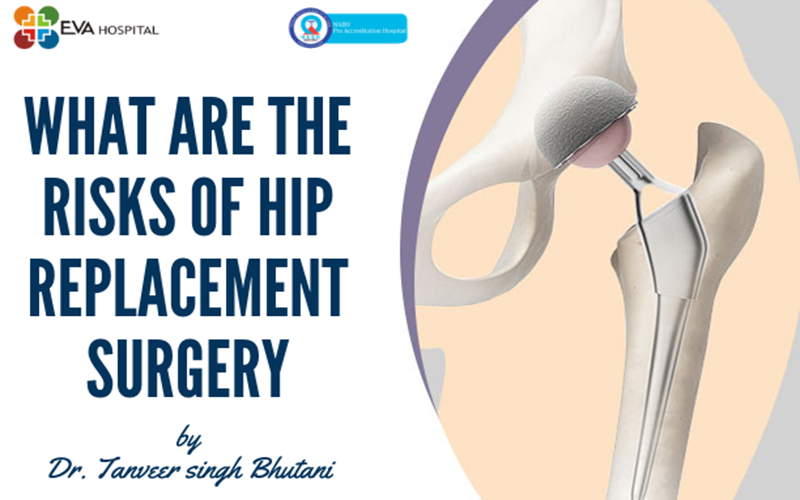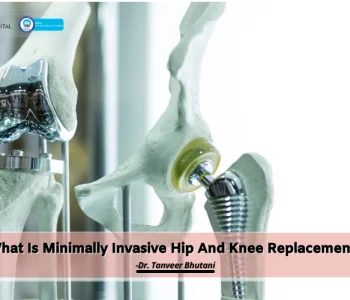What are the risks of Hip Replacement Surgery
 Hip Replacement surgery
Hip Replacement surgery
What are the risks of Hip Replacement Surgery
As arthritis in the body worsens, it may aggravate the pain in the hip to an extent that it interferes with your daily chores and sleep. You may be experiencing difficulty in climbing the stairs up or down.
Is walking, even with a walker or cane, getting difficult? This is the most appropriate time to get a diagnosis under a specialized orthopedic and seek help on replacement of the hip.
Hip replacement surgery or hip arthroplasty is the surgery where the surgeon removes the painful hip joint or the damaged section of the hip joint and replaces it with a prosthesis made of metal, hard plastic, or ceramics. This makes your hip less painful and prosthesis improves the ability to walk and carry on daily functions.
Why do You Need Hip Replacement Surgery?
When the conventional methods of treatment fail to provide relief or are not effective in relieving hip pain, hip replacement surgery becomes mandatory.
Difficulty in getting up from a seat, climbing the stairs, disturbed sleep because of pain, and persistent pain despite pain killers are a few symptoms to must consider before a hip replacement surgery.
Problems like Osteoarthritis, Rheumatoid Arthritis, and Osteonecrosis are also known to aggravate hip pain and discomfort. These problems tend to produce inflammation and result in damaging the bone.
What Happens During the Procedure?
The hip replacement surgery can be performed with a minimally invasive technique or traditional hip replacement surgery. The difference between the two approaches is mainly the size of the incision.
During the traditional hip replacement procedure, general anesthesia will be administered and then the surgeon makes an incision of about 8-10 inches along the side of the hip or the over the front.
The damaged ball portion of the joint and cartilage are removed using a saw. The surgeon then implants the newly constructed prosthesis and a new ballpoint of the joint into the pelvic bone to replace the damaged socket. He then closes the incision after reattaching the muscles.
In a minimally invasive surgery, the same procedure is involved with a smaller incision which implies lesser blood loss, smaller scar, shortened hospital stay, and speedier recovery.
Are there any Risks of Hip replacement Surgery?
Hip replacement surgery must be performed by an experienced and skillful surgeon. However, there may be one or more of the following risks after hip replacement surgery:
- Infection and Blood Clots
After the surgery, there may be blood clots in veins and the risk level rises when the clot may travel to the heart or lungs. You may be prescribed blood-thinning medications post-surgery to avert this risk.
Also, chances of infection in the incision are high and if any infection occurs near the prosthesis, it may damage the new prosthesis. The doctor will be administering strong antibiotics to ward off infections.
- Dislocation
The new ballpoint may get dislocated with somebody’s postures. This may call for another surgery or braces to rectify the dislocated ballpoint.
- Need for a Second Hip Replacement Surgery
In some cases, the hip joint wears out gradually and this may require a second hip replacement surgery. However, with advanced technology, prosthesis is getting more durable and safe.
- Altered Leg Length
Sometimes due to the new hip, the legs may not be of equal length after the surgery. You may be required to practice some stretches and exercises to avoid this situation.
- Allergies to Metal
There may be a chance you are allergic to the metal implant and this may cause certain complications. Also metal on metal implants may release metal ions in the bloodstream causing trouble.
The skill and experience of the surgeon determine the level of complications after the hip replacement surgery. Dr. Tanveer Bhutani, from EVA Hospital, is the best orthopedic in Punjab with credible experience in hip replacement surgeries. With his surgical acumen, the risks of the surgery are reduced to a minimum.
The surgery takes around 6-12 months to recover fully and revive the routine activities. Regular follow-ups with the surgeon, physical therapy, and following the precautions are ways to enhance the success of the surgery.
Final Thoughts
For a successful hip implant, make sure your diagnosis and surgical procedure are under the guidance of an experienced surgeon. The new hip joint will reduce the pain (before the surgery) drastically and enhance your mobility.
You may have to avoid high-movement physical activities like playing basketball, but activities like swimming, playing golf, and riding a bike are advisable.
For relief from excruciating pain or any query, contact the best orthopedic-Dr. Tanveer Bhutani at EVA Hospital.









